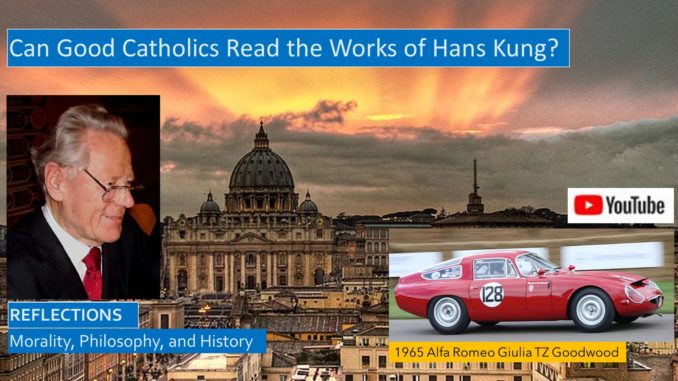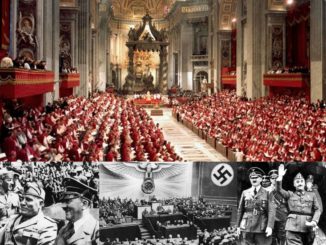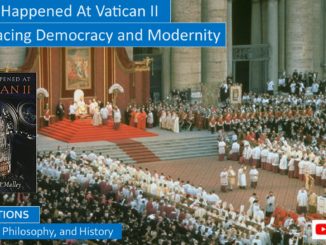
When I was young and wandering around used book stores I picked up some really good books by one of the main theologians of Vatican II, Hans Kung, which were quite inspirational and my first exposure to Catholic theology. Kung wrote some good books on the five great Christian thinkers, including Luther, on the Creed, and a very influential book examining the Lutheran doctrine on Justification, and how the formulation of justification by faith by the prominent Protestant theologian Karl Barth was not in conflict with the Catholic doctrine on justification. This may have led to the joint Lutheran-Catholic declaration on justification that is included in the Denzinger collection.
YouTube video for this blog: https://youtu.be/Nbtinm3ATgI
YouTube script with book links: https://www.slideshare.net/BruceStrom1/can-good-catholics-read-the-works-of-hans-kung-how-hans-kung-influenced-the-second-vatican-council-and-the-modern-catholic-church
Indeed I was surprised to learn that Hans Kung had sufficiently irritated the Catholic Church that they revoked his license to teach Catholic theology, which led his university to instead create a seat of ecumenical theology so he could continue to teach, an arrangement that the Vatican did not protest. But Hans Kung was not excommunicated, nor was he defrocked, as a priest in good standing he can continue to serve the sacraments if he wishes. One of the changes in attitude of the Catholic Church at the Second Vatican Council is that the Catholic Church no longer publishes a list of forbidden books, which means that there is no prohibition against reading the books by Hans Kung.
Nevertheless, these questions are both interesting: Can Good Catholics Read Hans Kung? Should Devout Catholics Read Hans Kung? We should all read books on theology, philosophy, and psychology with discernment, testing them first against Scripture then Church teaching, and you should definitely read the books by Hans Kung with discernment. Most importantly, by learning more about why the Catholic Church was goaded into announcing this discipline against Hans Kung, we can learn anyone who wishes to read and discuss these timeless topics can do so with humility, without succumbing to pride.
My impression when I read many of his incredibly wide-ranging books decades ago, including “Does God Exist,” “On Being a Christian,” and “Christianity” was just amazement of the wide scope of topics covered and the spiritual insights he offers in these books. Hans Kung is truly brilliant, perhaps too brilliant. He is not shy about proclaiming how the Catholic must change, must reform, must pay attention to his incredibly detailed and numerous lists of suggestions if the Catholic Church is to remain relevant in the modern world.
Several decades ago, I read an news article that quoted Cardinal Schonborn as saying that although Hans Kung was quite beloved in the Vatican, they really wish he would quit constantly calling press conferences where he criticized the Catholic Church for ignoring all his urgent suggestions for reform.[1] Although there is sympathy although not total agreement with his liberal views on topics like priestly celibacy, the sexual scandals, and papal infallibility, his constantly clamoring questioning of the Church teachings on these topics was not helpful, especially after he kept rocking the boat after being repeatedly warned that his boat might sink if he persisted. Some of the more provocative titles of some of his books may not have helped either.
Hans Kung was a friend to many in the inner circles of the Catholic Church, since he was one of the leading theologians of the Second Vatican Council. Indeed, he gave a friendly reference to the young priest Ratzinger, who was later Pope Benedict, when he was accepted as a professor at the University of Tubingen in Germany. Hans Kung was always the more flamboyant, driving around campus in his sportscar. While teaching at Tubingen they had dinner each Thursday to discuss theology, and they both were editors of a scholarly theology journal. Sources claim that Ratzinger became more conservative politically in response to the student protests in the Sixties, though both Kung and Ratzinger always supported the theological pronouncements of Vatican II.
https://en.wikipedia.org/wiki/Hans_K%C3%BCng
Although his license to teach Catholic theology was revoked in 1979, Pope Benedict publicly agreed to spend one fall afternoon in 2005 with his old university friend, Hans Kung. Oh that I could be a fly on the wall to listen to their discussions! Their meeting was cordial as they reminisced about their friendship in their youth, they agreed to disagree, the teaching restriction was likely not discussed, but Pope Benedict did say that he supported Kung’s current project.
“In terms of substance, Küng said the two men found agreement on matters of social policy, the relationship between faith and reason and between science and religion, and the need for Christianity to collaborate with other world religions in building what Küng has termed a “global ethic.” The following article discusses this meeting and some background on why Kung’s license to teach Catholic theology was revoked:
http://www.natcath.org/NCR_Online/archives2/2005d/100705/100705l.php
This article quotes a fellow theologian saying this about Hans Kung: “Sometimes Küng conducts himself like a second magisterium. To tell you the truth, one is enough, at least for me.”
Hans Kung the troublemaker said this in an article submitted to the National Catholic Reporter: “On March 9, 2016, my appeal to Pope Francis to give room to a free, unprejudiced and open-ended discussion on the problem of infallibility appeared in the leading journals of several countries. I was thus overjoyed to receive a personal reply from Francis immediately after Easter. Dated March 20, it was forwarded to me from the nunciature in Berlin.”
https://www.ncronline.org/news/theology/fr-hans-kung-says-francis-responded-request-free-discussion-infallibility-dogma
You can read Kung’s summary of the response of Pope Francis in this article. The main take-away is that Catholics can safely read the writings of Hans Kung, that the Catholic Church has no interest in banning books. There is no mention that
In the following article dated April 19, 2010, Hans Kung points finger at Pope Benedict regarding the continuing child-sex scandal in the Catholic Church, and other topics. The article includes the text of his open letter to the bishops of the Catholic Church. The reporter notes that he had a friendly phone conversation with Hans Kung on the phone but that he declined an interview regarding his letter.
https://www.bbc.co.uk/blogs/ni/2010/04/hans_kung_points_finger_at_the.html
EXCERPTS FROM VATICAN DOCUMENT ON HANS KUNG
The following excerpts from the 1979 declaration revoking the license for Hans Kung to teach Catholic theology by Pope John Paul II, seconded by Cardinal Ratzinger, shows the irritation at Hans Kung repeatedly admonishing the faithful as if he were himself like a second magisterium.
“Since some of the writings – spread throughout many countries – and the teaching of Professor Hans Küng, a priest, are a cause of disturbance in the minds of the faithful, the bishops of Germany and this Congregation for the Doctrine of the Faith, acting in common accord, have several times counseled and warned him in order to persuade him to carry on his theological work in full communion with the authentic Magisterium of the Church.”
“In this spirit the Sacred Congregation for the Doctrine of the Faith, in order to fulfill its role of promoting and safeguarding the doctrine of faith and morals in the universal Church, issued a public document oh Feb. 15, 1975, declaring that some opinions of Professor Hans Küng were opposed in different degrees to the doctrine of the Church which must be held by all the faithful. Among these opinions it noted especially, as of greater importance, those which pertain to the dogma of faith about infallibility in the Church, to the task of authentically interpreting the unique sacred deposit of the word of God which has been entrusted only to the living Magisterium of the Church, and finally to the valid consecration of the Eucharist.”
“This fact is particularly evident in the matter of the opinion which at least puts in doubt the dogma of infallibility in the Church or reduces it to a certain fundamental indefectibility of the Church in truth, with the possibility of error in doctrinal statements which the Magisterium of the Church teaches must be held definitively. On this point Hans Küng has in no way sought to conform to the doctrine of the Magisterium. Instead he has recently proposed his view again more explicitly, even though this sacred congregation had affirmed that such an opinion contradicts the doctrine defined by Vatican Council I and confirmed by Vatican Council II. Moreover, the consequences of this opinion, especially a contempt for the Magisterium of the Church, may be found in other works published by him, undoubtedly with serious harm to some essential points of Catholic faith (e.g., those teachings which pertain to the consubstantiality of Christ with his Father, and to the Blessed Virgin Mary), since the meaning ascribed to these doctrines is different from that which the church has understood and now understands.”
“The Sacred Congregation for the Doctrine of the Faith in the aforesaid document of 1975 refrained at the time from further action regarding the above-mentioned opinions of Professor Küng, presuming that he himself would abandon them. But since this presumption no longer exists, this sacred congregation by reason of its duty is constrained to declare that Professor Hans Küng, in his writings, has departed from the integral truth of Catholic faith, and therefore he can no longer be considered a Catholic theologian nor function as such in a teaching role.”
http://www.vatican.va/roman_curia/congregations/cfaith/documents/rc_con_cfaith_doc_19791215_christi-ecclesia_en.html
OTHER OPINIONS OF HANS KUNG
With help from Dr Google we reviewed the perspectives of other Catholic leaders regarding Hans Kung which we thought helpful.
This is from the May 13, 2013 issue of America Magazine, the national Jesuit magazine, which reprints the original editorial from the May 11, 1963 edition. In their concluding paragraph they state:
“We do not entirely agree with Fr. Kung, but we would not think of charging him with talking foolishness. Every single item he brought up had already been recommended by a cardinal or bishop for the agenda of the Second Vatican Council. Maybe he was imprudent to talk so much. Well, we like that quotation he took from Pope John’s encyclical Pacem in Terris: ‘One must never confuse error and the person who errs.’ “
https://www.americamagazine.org/content/all-things/editors-hans-kung
Hans Kung was quite fond of writing open letters that to scold and irritate his friends in the Catholic hierarchy, so the famed Catholic author George Weigel penned this humorous open letter to Hans Kung, excerpts below:
“A decade and a half ago, a former colleague of yours among the younger progressive theologians at Vatican II told me of a friendly warning he had given you at the beginning of the Council’s second session. As this distinguished biblical scholar and proponent of Christian-Jewish reconciliation remembered those heady days, you had taken to driving around Rome in a fire-engine red Mercedes convertible, which your friend presumed had been one fruit of the commercial success of your book, The Council: Reform and Reunion.” (Note: I plan to read this for a future blog.)
“This automotive display struck your colleague as imprudent and unnecessarily self-advertising, given that some of your more adventurous opinions, and your talent for what would later be called the sound-bite, were already raising eyebrows and hackles in the Roman Curia. So, as the story was told me, your friend called you aside one day and said, using a French term you both understood, ‘Hans, you are becoming too evident.’ ”
“Yet I venture to guess that the iron really entered your soul when, on December 22, 2005, the newly elected Pope Benedict XVI, ‘the man whose appointment to the theological faculty at Tübingen you had once helped arrange’ addressed the Roman Curia and suggested that the argument was over: and that the conciliar ‘hermeneutics of reform,’ which presumed continuity with the Great Tradition of the Church, had won the day over ‘the hermeneutics of discontinuity and rupture.’ ”
“Perhaps, while you and Benedict XVI were drinking beer at Castel Gandolfo in the summer of 2005, you somehow imagined that Ratzinger had changed his mind on this central question. He obviously had not. Why you ever imagined he might accept your view of what an ‘ongoing renewal of the Church’ would involve is, frankly, puzzling. Nor does your analysis of the contemporary Catholic situation become any more plausible when one reads, further along in your latest op-ed broadside, that recent popes have been ‘autocrats’ against the bishops; again, one wonders whether you have been paying sufficient attention. For it seems self-evidently clear that Paul VI, John Paul II, and Benedict XVI have been painfully reluctant some would say, unfortunately reluctant to discipline bishops who have shown themselves incompetent or malfeasant and have lost the capacity to teach and lead because of that: a situation many of us hope will change, and change soon, in light of recent controversies.”
https://www.firstthings.com/web-exclusives/2010/04/an-open-letter-to-hans-kung
Perhaps our friend George is a bit biting. Likewise, the conservative EWTN has some really harsh comments, which nevertheless contain some truths. These are excerpts from EWTN “Concluding Reflections” by Joseph F. Costanzo:
“We have noted Kung’s untheological distempers toward all that Rome signifies: the Curia, Canon Law, theology, administration. We note his negative criticism of Pope Paul’s VI’s encyclicals on the Church (Ecclesiam Suam, 1963), on the Blessed Eucharist (Mysterium Fidei, 1965), on Priestly Celibacy (Sacerdotalis Coelibatus, 1967), on Human Life (Humanae Vitae, 1968), the Credo (1968, a summation of all solemnly defined truths), the papal directives on mixed mariages (Motu Proprio of March 31, 1970).”
“We have noted that Kung exploits an uprooted history in his glissade of “errors of the ecclesiastical teaching office.” We have explained that these “errors” (?) were not errors touching upon ecclesial infallibility, papal, conciliar, and scriptural, and not infrequently it was a matter of prudential judgment. Kung’s denial of the primacy of jurisdiction does not take adequate account of the scriptural concept of authority. He has failed to grasp the deeper understanding of Church jurisdiction as it is uniquely and preeminently situated in Kepha. We have maintained that the primacy of service, understood in its fullest sense, the preservation and transmission of divine truths, and the means of sanctification, requires by a principled necessity in accordance with the Petrine texts primatial authority. Kung’s antithesis between law and liberty is neither Pauline nor evangelical. Kung’s employment of St. Augustine’s De Trinitate (1, 3, 5) hardly accords with St. Augustine’s own intentions and objectives.”
“Kung’s credibility is not only gravely at fault but it is seriously handicapped by a number of intellectual aporiae. His adversary “state of intellect” disposes him to separate, to dichotomize what are integral religious realities, inseparable constituents of the Catholic dogmas. He disjoins the institutional from the charismatic Church; the Pope, the visible head of the Church, from the Lord of glory, the invisible Head; the Pope from the Church; the Church from the Mystical Body of Christ; the Church’s teaching office from the abiding assistance of the Divine Spirit of Truth. He severs apart Tradition, Sacred Scripture, and the Magisterium and inserts an arbitrariness between them. The ‘clear passage to truth’ is considerably dimmed by Kung’s selective use of primary and secondary sources. Further, he misconstrues his sources, notably, the False Decretals, Verardo’s Introductio Editoris, St. Thomas Aquinas’ Contra Errores Graecorum. He uses authors selectively to suit his purpose and omits others whose theology is supportive of ecclesial infallibility, papal and conciliar, and the inerrancy of Scripture. Kung demands “proofs,” “substantiation,” “demonstration,” but he never explains what precisely would constitute “proof” in dogmatic theology on an article of faith.”
https://www.ewtn.com/catholicism/library/historical-credibility-of-hans-kung-10078
CONCLUSION
Much can be learned by reading the works of Hans Kung, and good Catholics should be reassured that reading Kung in the proper manner can be spiritually beneficial. However, the example of Hans Kung should remind us that no matter how much we know, we do not know everything; no matter how brilliant we may be, we cannot understand everything; and no matter how many degrees hang on our wall, we can and must learn from our brothers in Christ, who have much to teach us even if they only have family pictures hanging on their walls. We should never permit our hubris to override our humility as we seek to understand and discuss the teachings of the Church, and we should always revere Scripture, the teachings first of the ancient Church Fathers, then succeeding generations of Church Fathers and Teachers, Catholic, Orthodox, and Protestant.
This Catholic reflection that I have not seen elsewhere is in the beginning of one of Hans Kung’s books:
Duty without love breeds weariness;
duty with love breed constancy.
Responsibility without love breeds unconcern;
responsibility with love breeds concer.
Righteousness without love breeds hardness;
righteousness with love breeds reliability.
Education without love breeds contrariness;
education with love breeds patience.
Wisdom without love breeds rifts;
wisdom with love breeds understanding.
Friendliness without love breeds hypocrisy;
friendliness with love breeds grace.
Order without love breeds pettiness;
order with love breeds generosity.
Knowledge without love breeds dogmatism;
knowledge with love breeds trustworthiness.
Power without love breeds violence;
power with love breeds readiness to help.
Honor without love breeds arrogance;
honor with love breeds modesty.
Possessions without love breeds avarice;
possessions with love needs generosity.
Faith without love breeds fanaticism;
faith with love breeds peacemaking.[2]
[1] I cannot find the reference for this, it does not how up in the Google search, though it may be in a publication index somewhere. Let me know if you can find this reference.
[2] Hans Kung, Christianity, Essence, History, and Future (New York: Continuum Publishing Company, 1995), p. 57.




Be the first to comment